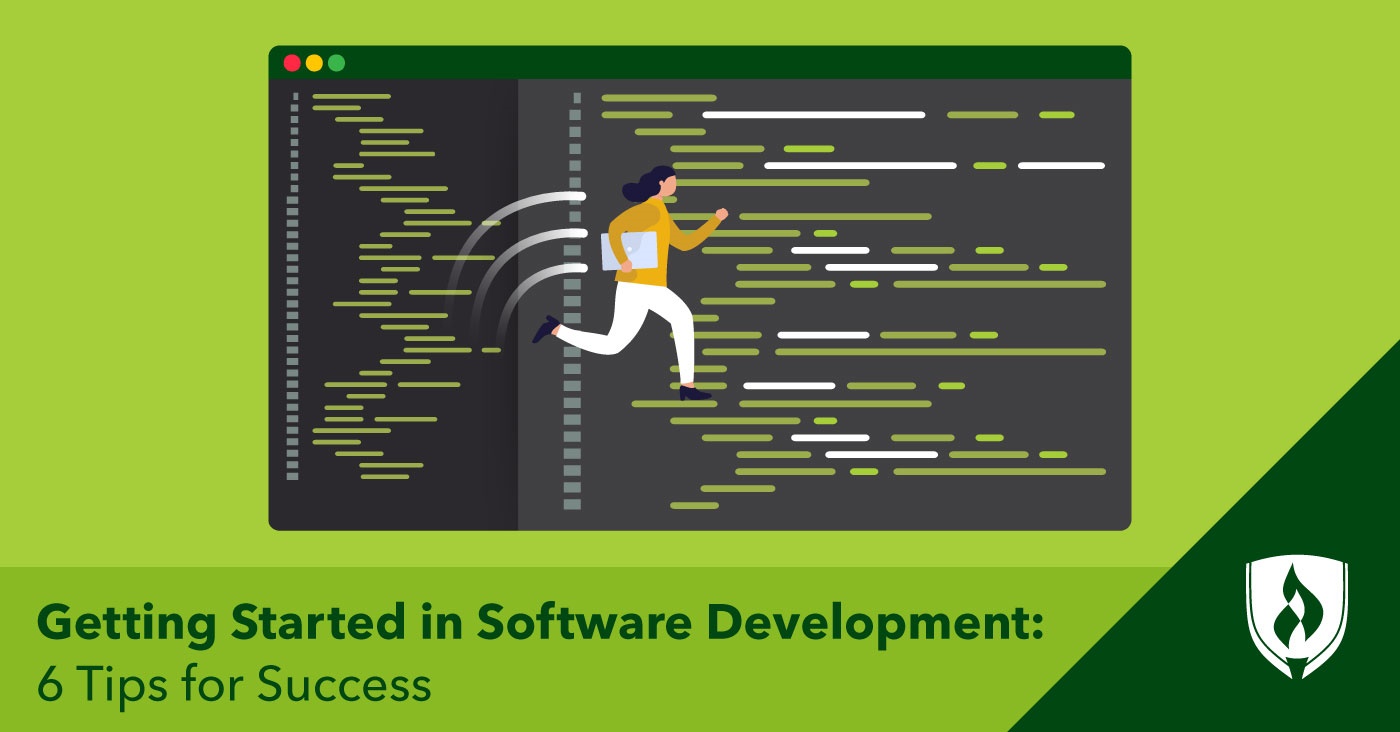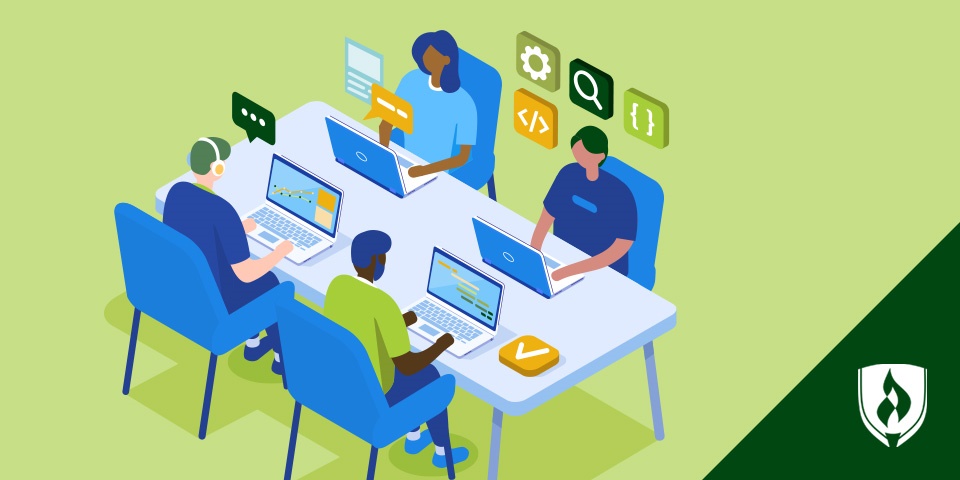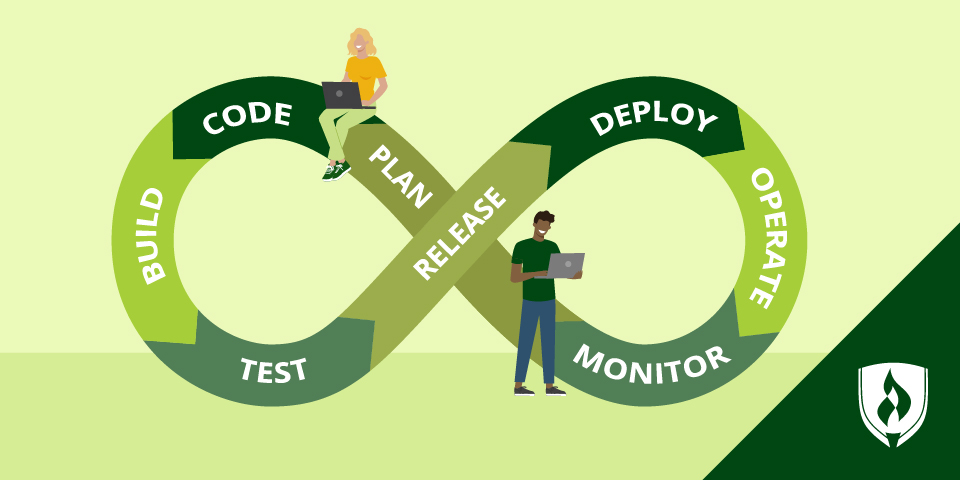
You have a knack for solving problems, creating orderly systems and finding creative ways to meet goals. Those traits paired with a strong interest in technology make a career in software development seem like it could be a natural fit. Having a potential goal is great, but you also need to have a plan for getting there—and that can be particularly tricky in a comparatively fast-changing field like software development. With scores of programming languages, education options and new technologies to grapple with, it’s completely understandable if you’re feeling overwhelmed on where to start.
The good news is that you’ve got time to figure it out. The software development field isn’t going anywhere and is positioned well for growth. In fact, employment of software developers, quality assurance analysts and testers is projected to grow 22 percent from 2019 to 2029, much faster than the four percent average for all occupations, according to the U.S. Bureau of Labor Statistics (BLS).1
Though specifics are bound to change, we dug up current data and got first-hand advice from software developers and tech recruiters on how to best embark on a career in software development. Keep reading for practical tips you can put to use.
6 Tips for getting started in software development
1. A formal education will help
While many tech positions may be more flexible about education requirements for candidates with the right mix of demonstrable skills and experience, a formal education can be a big help for those who are just getting started. According to the BLS, most software development roles require a Bachelor’s degree.1 That’s born out in our analysis of software development job postings as well—of the over 871,000 software developer job postings of the past year, over 94 percent were seeking candidates with a bachelor’s degree or a higher degree as a minimum requirement.2
Beyond knowing how to code, bigger employers seek to hire software developers with analytical thinking skills, a skill set that a college degree can help you develop. You’ll learn important computational theory while honing your coding skills. Matt Collingwood, managing director for VIQU, has found that most individuals going into software development pursue degrees in information technology, computer science, physics, math or software development.
John Li, CTO and co-founder of Fig Loans, notes that “It’s not impossible to get a job with less education, but it can be difficult to get your foot into the door without one.”
If you’re not ready to pursue a full Bachelor’s degree yet, it could be worth taking some online coding classes, earning a certificate or considering an Associate’s degree to get your feet wet.
2. Truly master one programming language
There are so many programming languages out there, it’s not a good use of your time to try to master them all. Though it’s good to have a strong grasp on a few, focusing your efforts on becoming very proficient with one language should help you get a foothold in the industry.
C++, Java®, Python® and C all tend to be useful in software development—if you pick a lane and master the underlying concepts of one, it becomes a little easier to make the transition to the next language.
That said, Li recommends beginners take an iterative approach. “Whenever you build code that works, don’t stop there,” says Li. “Instead, consider ways to improve your code.”
3. Seek out projects for your portfolio
For some careers, it can be hard to prove you’re capable through just a resume or a CV. Luckily, software development is the kind of work that allows you to show off an end product. While showing samples of your programming work from school can certainly provide a nice boost, it’s also worth seeking out internships. These opportunities will give you practical examples of real work to highlight, and can be a great reference point during job interviews.
Beyond a structured internship, you can contribute to open-source projects when you have extra time. Open source refers to any project with publicly-accessible code that people can modify and share. You can contribute to others’ projects or you can publish the code for your own on GitHub®.
“Use it as your developer resume. It says more about your coding ability than a CV or interview,” says Brad Touesnard, founder & CEO of SpinupWP. He also recommends contributing to as many open-source libraries as you can to get noticed by prospective employers.
4. Don’t overlook the value of soft skills
When you still have so many technical skills left to master, it’s easy to forget about many of the soft skills you’ve already been working on that will play a role in your career as a software developer.
As you learn, start new projects, and meet new people, keep soft skills like communication and collaboration in mind. Think about what you can do to be a better teammate, and make a note of how your soft skills do make a difference in your professional relationships.
At the beginning of your career, you’ll likely be competing with applicants who have more experience than you. For junior developer positions, companies will often take more stock of your attitude and desire to learn than your technical knowledge, says Irina Sharaiyri, HR team lead at Wirtek. Being technically sound is great, but you should also strive to be a person other employers want to work with.
Take interview opportunities to emphasize your soft skills. “Passion, motivation and a positive attitude can differentiate you from other applicants,” notes Sharaiyri.
5. Keep learning outside the classroom
Not only is it important to keep practicing your code outside the classroom, you’ll also want to stay abreast of tech news and market trends. “Staying active in the technical community is very important,” says Sharaiyri. Take on stretch projects for fun, follow online tutorials, complete coding challenges and keep yourself dedicated to honing your skills.
You can also keep up to date with software developers around the world on sites like StackOverflow, Hashnode or Coderwall.
6. Seek out a mentor
When you’re first getting into software development, it can help to find someone in the industry who you can have a conversation with. They can tell you about their day-to-day and their journey to get to where they are. You’ll find out more about what the profession is like and if you might truly enjoy the work.
There’s a lot to be learned from someone who’s been in your shoes—so do what you can to seek out connections. While it might be a little bit tricky to break the ice and put yourself out there, the benefits of having an informal network of potential mentors or colleagues far outweigh the negative.
Position yourself for a software development career
As you can see, there are plenty of steps you can take when it comes to getting started in software development. Taking action on just a few of these steps can help lead you to the software development career you’ve been dreaming of.
That said, it will be tough to get your foot in the door without a formal education. Earning a relevant degree is an excellent stepping-stone on the path to this career field. Find out how you can get started with a Software Application Development degree from Rasmussen University.
Related Articles:
- The E-Commerce Developer Job Description, According to Actual Developers
- How to Become a Software Developer: Experts Expose Their Best Advice
1Bureau of Labor Statistics, U.S. Department of Labor, Occupational Outlook Handbook, [career information accessed September, 2021] https://www.bls.gov/ooh/computer-and-information-technology/software-developers.htm. Information represents national, averaged data for the occupations listed and includes workers at all levels of education and experience. This data does not represent starting salaries. Employment conditions in your area may vary.
2Burning-Glass.com (analysis of 871,001 software developer/engineer job postings, Aug. 1, 2020 – July 31, 2021)
Python is a registered trademark of the Python Software Foundation.
Java is a registered trademark of Oracle Corporation.
GitHub is a registered trademark of GitHub, Inc.




